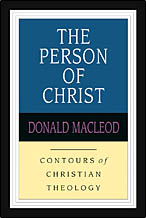 I have always maintained that theology, as it is the study of God, of his person and his ways, should never be dry or impractical. Too often, however, it is.
I have always maintained that theology, as it is the study of God, of his person and his ways, should never be dry or impractical. Too often, however, it is.
A glowing exception to this is Donald Macleod’s book The Person of Christ. This book, though academic in nature, cannot help but be devotional throughout because the subject matter draws out the author’s own devotion and wonder.
Here are a couple of quotes from a scholar who sees scholarship as a guide leading us to worship.
“For the Son of God, the incarnation meant a whole new set of relationships: with his father and mother; with his brothers and sisters; with his disciples; with the scribes, the Pharisees and Sadducees; with Roman soldiers and with lepers and prostitutes. It was within these relationships that he lived his incarnate life, experiencing pain, poverty and temptation; witnessing squalor and brutality; hearing obscenities and profanities and the hopeless cry of the oppressed. He lived not in sublime detachment or in ascetic isolation, but ‘with us’, as ‘the fellowman of all men’, crowded, busy, harassed, stressed and molested. No large estate gave him space, no financial capital guaranteed his daily bread, no personal staff protected him from interruptions and no power or influence protected him from injustice. He saved us from alongside us.” (page 180)
“The giving of the son is seen as the outstanding proof of the love of the Father. There was a unique bond between the Father and the Son, arising from the fact that th Son was uniquely lovable and the Father was uniquely affectionate. God could not have made a greater sacrifice. His love is astonishing precisely because at this point he put the world before his Son. The statement, ‘God gave the world for his Son’ would evoke no wonder. The statement, ‘God gave his Son for the world’ borders on the incredible. Conversely, the Son could not have suffered a greater loss. To have ‘lost’ the Father, as he did in the dereliction (Mark 15.34), was the greatest of all possible pains.” (page 73)
